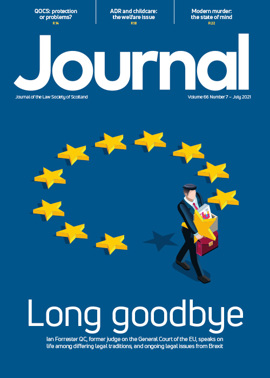Insolvency: When does COVID have a “financial effect”?
The Corporate Insolvency and Governance Act 2020 (“CIGA”) introduced temporary measures to restrict winding up petitions against businesses facing hardship by reason of the coronavirus pandemic. These included UK-wide limitations to the use of statutory demands, and restricting the court’s ability to grant petitions where coronavirus has had a “financial effect” on the company.
The latter restrictions (CIGA, sched 10, part 2) apply to petitions lodged or demands served during the “relevant period”. That period has been extended, most recently at the time of writing to expire on 30 September 2021.
“Financial effect” is defined broadly. Where the provision is engaged, the court may wind the company up only if it is satisfied that the company’s apparent insolvency would have arisen irrespective of the effects of coronavirus.
There is limited case law on the provisions. However, the recent English judgment in PGH Investments v Ewing [2021] EWHC 533 (Ch) sheds some light on the test to be applied.
Company’s guarantee
The case centred on a dispute between two shareholders of PGH who entered into an agreement whereby one (Neate) agreed to buy out the shareholding of the other (Ewing) and redeem certain loans to group companies. Under the agreement, the price was to be £825,000. PGH guaranteed Neate’s obligations under the contract.
Neate was unable to make payment of the price by the required date. Consequently, Ewing called on PGH under its guarantee and a petition to wind up PGH was raised. PGH raised an application for dismissal of the petition.
The judgment primarily revolved around interpretation of the contract and whether there was a genuine dispute as to liability. The court found that there was such a valid dispute and dismissed the petition.
The question of “financial effect”
However, the court also considered the question of whether the pandemic had resulted in a “financial effect” on PGH and whether the petition should be dismissed on those grounds. Although the judge’s comments on that element are obiter, they are a useful summation of the position.
First, the court took the view that the evidential burden falls on the debtor to establish a prima facie case that coronavirus has had a “financial effect”. The judgment refers to para 5 of sched 10 of CIGA in this regard, but not para 2. “Financial effect” means a worsening of the company’s financial position in consequence of, or for reasons relating to, coronavirus. If that is demonstrated, the burden then falls on the petitioner to show that if that effect is ignored, the company would still be unable to pay its debts as they fall due.
Before the court was a witness statement from Neate. He made three assertions:
- The pandemic had a dramatic effect on liquidity investment worldwide, making it difficult to find investors and resulting in a loss of anticipated investment to the business.
- Potential investors in PGH were worldwide. Constraints imposed by the pandemic restricted travel and made business development problematic.
- Day-to-day operations of the company had been severely impacted by the pandemic.
More broadly, Neate referenced the difficulties in trading during the pandemic, the need for the group to reach forbearance arrangements with creditors until after the pandemic and the negotiations he conducted with Ewing, regarding extending the time for the purchase of shares.
The petitioner argued that these assertions did not meet the test. They were unsupported by evidence, pointed to only indirect rather than direct consequences and were largely irrelevant given that the company was a holding company that did not trade.
The court considered that indirect effects of the pandemic would suffice in order to bring the company within the terms of the provision. However, it agreed that none of these assertions had been evidenced. This could be contrasted with Re A Company [2020] EWHC 1551 (Ch), where evidence was produced. The discharge of the burden on the company required some basic evidence. The court therefore concluded that it could not hold that coronavirus had had a financial effect on the company.
In summary
From a legal standpoint, the above is helpful when seeking to interpret some of the coronavirus restrictions around winding up petitions. Certainly, this case suggests that:
- the initial burden of proof may lie with the debtor, not the creditor, contrary to the apparent terms of para 2;
- the “financial effects” do not require to be direct, but may be indirect; and
- while the threshold is low, some evidence is required in order to overcome the burden of proof.
Perspectives
Features
Briefings
- Civil court: Final judgment
- Licensing: The shadow of criminal convictions
- Tax: Towards global rules for global businesses
- Immigration: Deporting the reformed character
- Coronavirus Acts: What does the new bill keep in force?
- Property: PSG at 20: still going strong
- In-house: Dealing at the cutting edge







